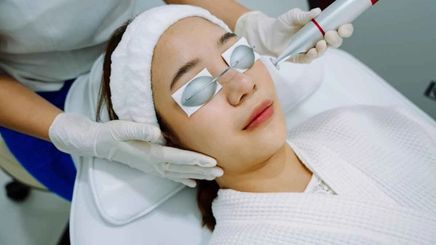
looks wonderful, but sometimes your pores have other ideas. While the occasional zit goes away within a few days, it can leave dark spots that persist for months. Enter laser treatment for acne scars, an in-office procedure to even out your complexion faster. It’s hailed as one of the most efficient and effective ways to smoothen and .
If you plan to get a laser treatment for acne scars, we’ll walk you through the process and at-home maintenance tips.
How Laser Treatment for Acne Scars Work
In general, the procedure involves a specialist carefully directing a laser beam onto the affected areas of your skin. The energy prompts the body's natural healing response, triggering the production of new collagen fibers. As a result, new skin cells regenerate while blemishes fade over time.
There are a variety of laser resurfacing technologies available at beauty clinics. These are either ablative or non-ablative. Consider getting the former when dealing with pitted acne scars and raised bumps. It removes the outermost layers containing the scar tissue. Meanwhile, a non-ablative laser is less risky and has a shorter recovery time — a viable option for first-timers, especially those with .
How to Take Care of Your Skin Post-Laser
Proper aftercare determines the line between a successful scar removal procedure and a red, swollen face. Laser treatments can be expensive, so make sure you get the most bang for your buck by following this guide to a T.
Sunscreen is a must.
Your skin is most vulnerable within the first 48 hours of your laser treatment for acne scars. The skin barrier is still healing after getting zapped repeatedly with a laser, making it more susceptible to . Therefore, excessive sun exposure can lead to prolonged redness, swelling, or even permanent scarring in some cases.
Before leaving the clinic, your dermatologist will apply sunscreen on your face to protect it against UVA and UVB rays. You may continue using the same formula as part of your aftercare routine, as these are usually gentler and won’t sting your skin.
When you return to your regular skincare regimen, try an SPF product that will help maintain your even-toned skin, like POND'S UV Bright Sunscreen. It has a non-sticky formula with zero white casts and Gluta-Niacinamide to help fade scars while guarding your skin against sun damage. Reapply every two hours, .
Wash your face after 24 hours.
After getting lasered, expect to have your face slathered in an occlusive cream (like ). It must stay on for 24 hours to help hydrate the skin and prevent moisture loss. You might be tempted to wash your face immediately, but you can only do so the following morning. In the meantime, avoid sweating!
Choose a gentle cleanser that removes buildup without stripping the skin dry. Dove Facial Cleansing Mousse Oil Control Care is a good option because it has 40% Active-boost serum, , and to help restore the skin barrier function. Plus, it's infused with which can aid in reducing redness and swelling.
Make sure to wash your hands with antibacterial soap before touching your face, and always use (not hot).
Moisturize, then moisturize some more.
Your dermatologist will most likely recommend a specific moisturizer you can safely use after a laser treatment for acne scars. If not, a good rule of thumb is to avoid active ingredients and fragrances. Look for a barrier cream with ingredients, such , antioxidants, and .
Aim to moisturize your face at least twice daily, in the morning and evening. But you can reapply whenever your skin feels tight. Use gentle, upward motions to avoid unnecessary friction or irritation.
Change your towels and pillowcases regularly.
Since you may need more than one laser appointment to see results, try changing your towels and every other day throughout this cycle. These two items absorb water, grime, and oil, creating the perfect breeding grounds for bacteria. Switching to textiles with antibacterial properties can also reduce the risks of post-treatment infections.
Sleep on your back.
Bad news for side sleepers. Tossing and turning in your slumber can cause unnecessary friction against your skin, disrupting the healing process. Try to keep your head and spine in a neutral position and use an extra pillow for neck support. Don’t worry, you can sleep however you like after all the peeling skin has come off.
Take a break from makeup.
Remember the last time you washed your and disinfected your beauty palette? Laser-treated skin is very sensitive, and makeup can introduce bacteria or other harmful microorganisms onto the vulnerable surface. You don't have to go barefaced forever, though. Wait two to 10 days before you do a full-beat face, or at least until any blisters or scabs disappear.
These tips can help you minimize side effects and maximize the results of laser treatment for acne scars. However, your doctor’s instructions always come first. Show up for your check-ups and be diligent about aftercare to make the most of your treatment (and hard-earned cash!).